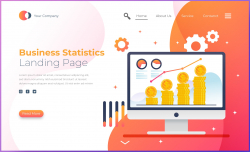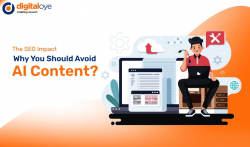
In recent years, Artificial Intelligence (AI) has become a transformative force across various industries, and search engine optimization (SEO) is no exception. The integration of AI into SEO practices is not only enhancing how businesses optimize their online presence but also revolutionizing the way search engines rank and deliver content. As AI continues to evolve, it’s crucial for SEO strategists to adapt and harness its power to stay ahead in the competitive digital landscape. This blog explores the significant impact of AI on SEO and how it is shaping the future of search strategies.
1. AI-Powered Search Engines: A Smarter Way to Rank Content
Search engines like Google have long used algorithms to determine how content is ranked in search results. However, with the integration of AI, these algorithms have become more sophisticated. AI-powered search engines are now capable of understanding context, semantics, and user intent, leading to more accurate and relevant search results.
One of the most significant advancements in this area is Google’s BERT (Bidirectional Encoder Representations from Transformers) algorithm. BERT uses natural language processing (NLP) to better understand the nuances of human language. This allows Google to deliver more precise search results by interpreting the intent behind a query rather than just matching keywords. For SEO strategists, this means that optimizing content for user intent and providing valuable, contextually relevant information is more important than ever.
2. Content Creation and Optimization: AI as a Strategic Tool
AI is also playing a pivotal role in content creation and optimization. Tools powered by AI can analyze vast amounts of data to identify trends, keywords, and topics that resonate with target audiences. This data-driven approach enables SEO strategists to create content that is not only optimized for search engines but also tailored to the preferences and needs of users.
Moreover, AI-driven content generation tools like GPT-4 (Generative Pre-trained Transformer) can assist in creating high-quality content at scale. These tools can generate blog posts, product descriptions, and even entire articles based on a set of keywords or topics. While human creativity and insight are still essential, AI can significantly reduce the time and effort required to produce content, allowing SEO strategists to focus on more complex tasks such as strategy development and audience engagement.
3. Personalization and User Experience: Enhancing Engagement with AI
Personalization has become a key factor in SEO, and AI is at the forefront of delivering personalized experiences to users. By analyzing user behavior, preferences, and past interactions, AI can create personalized content recommendations, search results, and even website experiences. This not only improves user engagement but also increases the likelihood of conversions.
For example, AI can personalize search results based on a user’s location, search history, and demographic information. If a user frequently searches for healthy recipes, AI can prioritize content related to healthy eating in their search results. For SEO strategists, this means that understanding the audience and tailoring content to meet their specific needs is crucial for success.
4. Voice Search Optimization: The Rise of Conversational AI
The rise of voice search is another area where AI is having a profound impact on SEO. As virtual assistants like Siri, Alexa, and Google Assistant become more popular, the way people search for information is changing. Voice searches are often longer and more conversational than text-based searches, requiring SEO strategists to rethink their approach to keyword optimization.
AI-driven voice recognition and natural language processing technologies are enabling search engines to better understand and respond to voice queries. This shift towards conversational AI means that SEO strategies must focus on optimizing for long-tail keywords and natural language phrases. Additionally, providing clear and concise answers to common questions can improve a website’s chances of appearing in voice search results.
5. AI-Driven Analytics and Insights: Data-Driven Decision Making
Data is at the core of effective SEO, and AI is enhancing the way data is analyzed and interpreted. AI-powered analytics tools can process vast amounts of data quickly and accurately, providing SEO strategists with valuable insights into user behavior, website performance, and content effectiveness.
For instance, AI can identify patterns in user behavior, such as which pages have the highest bounce rates or which content drives the most engagement. By understanding these patterns, SEO strategists can make data-driven decisions to optimize content, improve user experience, and boost search rankings.
Furthermore, AI can predict future trends and opportunities by analyzing historical data and current market conditions. This predictive capability allows SEO strategists to stay ahead of the competition by proactively adapting their strategies to meet emerging trends and user demands.
6. The Future of SEO: Embracing AI for Long-Term Success
As AI continues to advance, its impact on SEO will only grow. The future of SEO will likely involve even more sophisticated AI tools and technologies that can automate and optimize various aspects of search strategy. However, while AI can significantly enhance SEO efforts, it’s important to remember that it is a tool, not a replacement for human expertise.
SEO strategists must continue to hone their skills, stay informed about the latest developments in AI, and learn how to effectively integrate AI into their strategies. By embracing AI and leveraging its capabilities, SEO professionals can not only improve their current practices but also future-proof their strategies in an ever-evolving digital landscape.
In conclusion, AI is undeniably changing the game for SEO strategists. From smarter search engines and personalized experiences to voice search optimization and data-driven insights, AI is shaping the future of search strategy in profound ways. By understanding and harnessing the power of AI, SEO professionals can enhance their strategies, improve search rankings, and ultimately deliver better results for their clients or businesses.
Digital Marketer
At the forefront of our digital initiatives stands Umesh Gupta, our esteemed author and visionary leader in the realm of digital marketing. With a passion for innovation and a keen understanding of the ever-evolving digital landscape, Umesh Gupta brings a wealth of expertise and experience to the table. The Complete 2025 Landing Page Optimization Checklist You Need
The Complete 2025 Landing Page Optimization Checklist You Need
 Does Google Penalize AI Content? The Truth About AI and SEO in 2025
Does Google Penalize AI Content? The Truth About AI and SEO in 2025
 People Also Search For (PASF): Meaning and Its Impact on SEO
People Also Search For (PASF): Meaning and Its Impact on SEO
 Why Your Business Needs an SEO Company for Digital Success
Why Your Business Needs an SEO Company for Digital Success
 How to Choose The Best SEO Company in Delhi
How to Choose The Best SEO Company in Delhi
 Why Your Business Needs Professional PPC Management to Maximize ROI?
Why Your Business Needs Professional PPC Management to Maximize ROI?
 The August 2024 Core Google Update: What You Need to Know?
The August 2024 Core Google Update: What You Need to Know?
 Effective Ways to Recover from Declining Google Ads Performance
Effective Ways to Recover from Declining Google Ads Performance
 The SEO Impact: Why You Should Avoid AI Content?
The SEO Impact: Why You Should Avoid AI Content?
 The Power of Google Shopping Ads: Driving E-Commerce Sales to New Heights
The Power of Google Shopping Ads: Driving E-Commerce Sales to New Heights